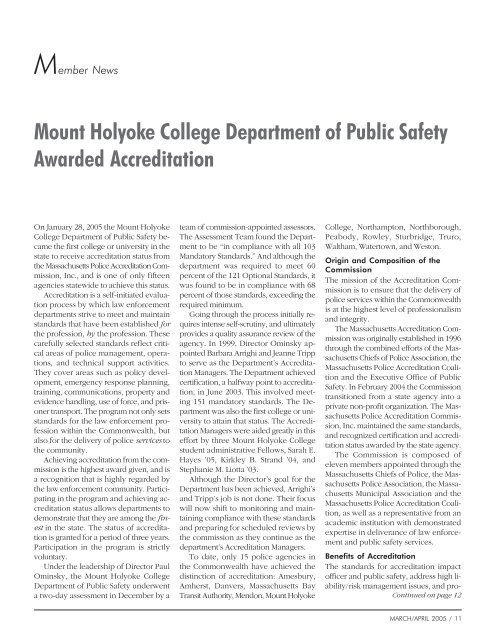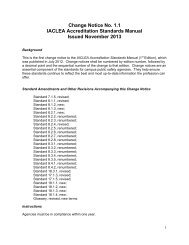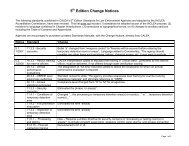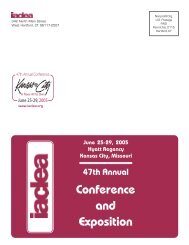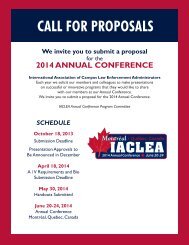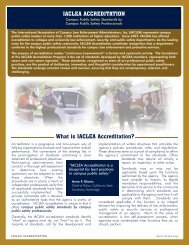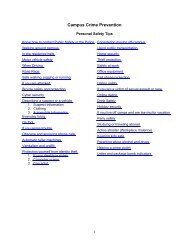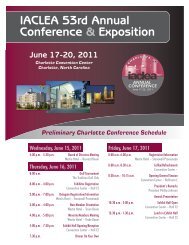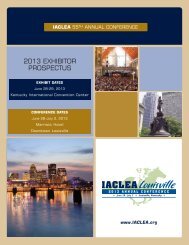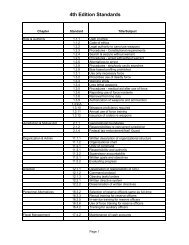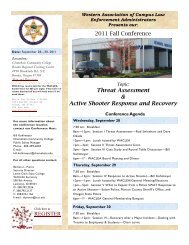Volume 35, No. 2 - March/April 2005 Campus Law ... - IACLEA
Volume 35, No. 2 - March/April 2005 Campus Law ... - IACLEA
Volume 35, No. 2 - March/April 2005 Campus Law ... - IACLEA
You also want an ePaper? Increase the reach of your titles
YUMPU automatically turns print PDFs into web optimized ePapers that Google loves.
Member News<br />
Mount Holyoke College Department of Public Safety<br />
Awarded Accreditation<br />
On January 28, <strong>2005</strong> the Mount Holyoke<br />
College Department of Public Safety became<br />
the first college or university in the<br />
state to receive accreditation status from<br />
the Massachusetts Police Accreditation Commission,<br />
Inc., and is one of only fifteen<br />
agencies statewide to achieve this status.<br />
Accreditation is a self-initiated evaluation<br />
process by which law enforcement<br />
departments strive to meet and maintain<br />
standards that have been established for<br />
the profession, by the profession. These<br />
carefully selected standards reflect critical<br />
areas of police management, operations,<br />
and technical support activities.<br />
They cover areas such as policy development,<br />
emergency response planning,<br />
training, communications, property and<br />
evidence handling, use of force, and prisoner<br />
transport. The program not only sets<br />
standards for the law enforcement profession<br />
within the Commonwealth, but<br />
also for the delivery of police services to<br />
the community.<br />
Achieving accreditation from the commission<br />
is the highest award given, and is<br />
a recognition that is highly regarded by<br />
the law enforcement community. Participating<br />
in the program and achieving accreditation<br />
status allows departments to<br />
demonstrate that they are among the finest<br />
in the state. The status of accreditation<br />
is granted for a period of three years.<br />
Participation in the program is strictly<br />
voluntary.<br />
Under the leadership of Director Paul<br />
Ominsky, the Mount Holyoke College<br />
Department of Public Safety underwent<br />
a two-day assessment in December by a<br />
team of commission-appointed assessors.<br />
The Assessment Team found the Department<br />
to be “in compliance with all 103<br />
Mandatory Standards.” And although the<br />
department was required to meet 60<br />
percent of the 121 Optional Standards, it<br />
was found to be in compliance with 68<br />
percent of those standards, exceeding the<br />
required minimum.<br />
Going through the process initially requires<br />
intense self-scrutiny, and ultimately<br />
provides a quality assurance review of the<br />
agency. In 1999, Director Ominsky appointed<br />
Barbara Arrighi and Jeanne Tripp<br />
to serve as the Department’s Accreditation<br />
Managers. The Department achieved<br />
certification, a halfway point to accreditation,<br />
in June 2003. This involved meeting<br />
151 mandatory standards. The Department<br />
was also the first college or university<br />
to attain that status. The Accreditation<br />
Managers were aided greatly in this<br />
effort by three Mount Holyoke College<br />
student administrative Fellows, Sarah E.<br />
Hayes ’05, Kirkley B. Strand ’04, and<br />
Stephanie M. Liotta ’03.<br />
Although the Director’s goal for the<br />
Department has been achieved, Arrighi’s<br />
and Tripp’s job is not done. Their focus<br />
will now shift to monitoring and maintaining<br />
compliance with these standards<br />
and preparing for scheduled reviews by<br />
the commission as they continue as the<br />
department’s Accreditation Managers.<br />
To date, only 15 police agencies in<br />
the Commonwealth have achieved the<br />
distinction of accreditation: Amesbury,<br />
Amherst, Danvers, Massachusetts Bay<br />
Transit Authority, Mendon, Mount Holyoke<br />
College, <strong>No</strong>rthampton, <strong>No</strong>rthborough,<br />
Peabody, Rowley, Sturbridge, Truro,<br />
Waltham, Watertown, and Weston.<br />
Origin and Composition of the<br />
Commission<br />
The mission of the Accreditation Commission<br />
is to ensure that the delivery of<br />
police services within the Commonwealth<br />
is at the highest level of professionalism<br />
and integrity.<br />
The Massachusetts Accreditation Commission<br />
was originally established in 1996<br />
through the combined efforts of the Massachusetts<br />
Chiefs of Police Association, the<br />
Massachusetts Police Accreditation Coalition<br />
and the Executive Office of Public<br />
Safety. In February 2004 the Commission<br />
transitioned from a state agency into a<br />
private non-profit organization. The Massachusetts<br />
Police Accreditation Commission,<br />
Inc. maintained the same standards,<br />
and recognized certification and accreditation<br />
status awarded by the state agency.<br />
The Commission is composed of<br />
eleven members appointed through the<br />
Massachusetts Chiefs of Police, the Massachusetts<br />
Police Association, the Massachusetts<br />
Municipal Association and the<br />
Massachusetts Police Accreditation Coalition,<br />
as well as a representative from an<br />
academic institution with demonstrated<br />
expertise in deliverance of law enforcement<br />
and public safety services.<br />
Benefits of Accreditation<br />
The standards for accreditation impact<br />
officer and public safety, address high liability/risk<br />
management issues, and pro-<br />
Continued on page 12<br />
MARCH/APRIL <strong>2005</strong> / 11


